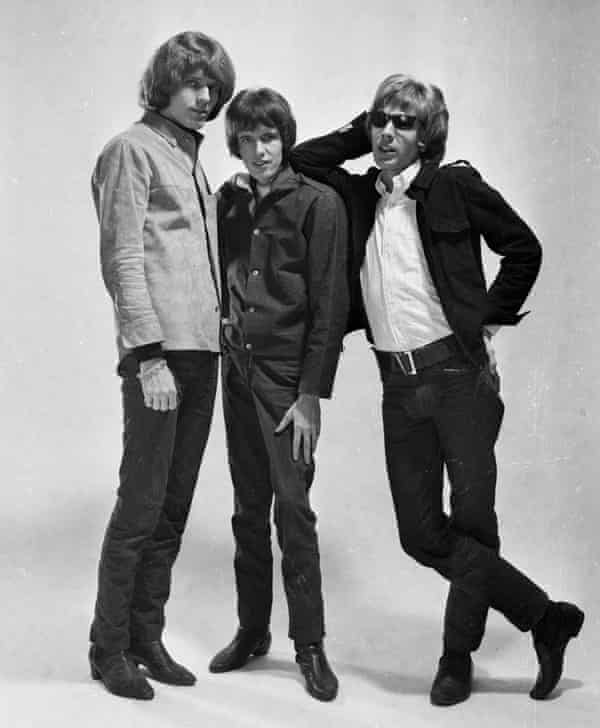On Your Own Again Lyrics Scott Walker
A wintry afternoon and London's roads are rammed with traffic. Mortifyingly, I am late to come across Scott Walker, the musical fable who rarely gives interviews, and ring, filled with apologies. No trouble, assures his manager, Scott'due south late likewise, he's stuck on the jitney. If rock'n'roll is the story of men who, in Bob Geldof's description of Phil Lynott, "couldn't imagine a life not in leather trousers, with a limousine taking him to piece of work every 24-hour interval", Walker is its antonym. When we finally sit down, I could more easily picture the figure in front of me, snaggle-toothed and with a cap firmly pulled downward over his eyes, as the protagonist of a Raymond Carver brusque story, about to grind his way through another day.
Not that he isn't perfectly cheerful, in his own fashion, with occasional hints of mischief and lugubrious sense of humor. Of Sundog – a choice of his lyrics over half-dozen decades – he reveals that one of the challenges in assembling it was having to go back: "Information technology requires listening – and I didn't want to do that. Cos, yous know, I don't listen to anything I've done once I've done it."

Fortunately, the cyberspace came to his rescue, in the shape of "all kinds of people who've printed your lyrics out". This is the Walker fandom, who accept followed him through his primeval incarnation as one of the iii Walker Brothers (not brothers and none of them originally called Walker), through solo balladry, easy listening and interpretations of Jacques Brel, to the intense, complex albums of his later career.
Only why practise information technology at all? "My friend Jarvis Cocker approached me a few years ago and said, 'Everyone'southward doing it. You lot've got to practice it. I've washed it.' And I said OK. Just I'm a great prevaricator, so I went away and forgot nearly it."
The effect is thrillingly uncategorisable: densely allusive and imagistic, resistant to obvious interpretation and suggestive of a vast range of literary and musical interests. The novelist Eimear McBride provides an introduction, but sensibly avoids any attempt at definitive comprehension: "He volition not protect or guide you lot," she writes. "He takes no pains to reassure that if the right procedures are followed, and the necessary obeisance made, one twenty-four hour period all meanings volition be revealed. Quite the reverse."
Timeline Scott Walker: his key albums
Prove
From smooth 60s lounge music to ragged doom metal, Scott Walker made 1 of the most boggling journeys in popular
Take It Like shooting fish in a barrel With the Walker Brothers
Debut LP. Three unrelated musicians – Scott Engel, John Maus and Gary Leeds – each adopted the surname Walker. The chart-topping, Burt Bacharach-penned Arrive Easy on Yourself remains 1 of Scott Walker's signatures, and i of the greatest breakup songs ever.
Scott 4
After the Walker Brothers disbanded in 1968, Walker created a run of self-titled, numbered albums that took string-drenched piece of cake listening into an increasingly strange, nighttime place, full of tragic storytelling. Scott 4 is the apotheosis, containing everything from ruminations on the 1968 invasion of Czechoslovakia to a rhapsodic, spectacularly cute retelling of Ingmar Bergman's film The Seventh Seal.
Nite Flights
The Walker Brothers reformed in the 1970s, and their brilliant final album together, Nite Flights, over again foreshadows Walker's later, weirder work. The four songs that Walker contributed range from the strutting glam of the championship track and Shutout, to the glacial soundscape of The Electrician.
Climate of Hunter
Walker'south take on the slick soft stone of the 1980s – in his only album that decade – is predictably off-axle. Dire Straits' Mark Knopfler on guitar meets circular-breathing sax from Evan Parker; pristine production is fabricated eerie by anomalous chords.
Tilt
Just as other artists might showtime to achieve for like shooting fish in a barrel nostalgia or see their creativity wane, Walker strikes out into avant-garde territory for this disturbing, dramatic tape. He lets his vocalism off the leash into e'er greater vibrato and wailing freedom, on the fashion to accidentally creating a parallel vision for post-rock.
The Migrate
The experiments on Tilt go more than mature a decade on, as the disquiet modulates into full-on agitation and terror. One song reflects on the death of Mussolini'south mistress, another examines nine/eleven through the prism of Elvis's dead twin blood brother. Wildly ambitious – and utterly magnificent.
Soused
A brilliant thought on paper – Walker collaborating with equally heavy, atmospheric doom metallers Sunn O))) – is brilliant in practice too: the ring's titanic, glacial riffs bear witness the perfect bedrock for Walker's startled pronouncements. He said it was his best record nonetheless.
Improve, she advises, to carelessness yourself to Walker'southward ungovernable imagination: to 1995'due south The Cockfighter, which "relocates" excerpts from the trials of Caroline of Brunswick and of Adolf Eichmann; to Jesse, from 2006, addressed to Elvis Presley's stillborn twin brother; to the "Bubonic, blue-blankets / run ragged with church building mice" from Herod 2014, fabricated in collaboration with the experimental Seattle band Sunn O))).
Some have a broader narrative ambition, such as SDSS 1416+13B. The seemingly impenetrable title refers to a brown dwarf recently discovered by astronomers. The subtitle – Zercon, a Flagpole Sitter – conjures a Moorish jester at the court of Attila the Hun. The song flits between wisecracks ("If shit were music / yous'd be a contumely ring"), grotesque imagery ("No more / dragging this wormy anus / round on shag piles from / Persia to Thrace") and an almost Beckettian bleakness ("The dark day behind the states / the dark day ahead").
And that bleakness underlies even the warmest-sounding lyrics, including Sundog itself, a new piece that takes inspiration from the cold, phantom suns of the universe: "Sundog / couldn't brand / the heat. / Sucked the nipple-zit / on frack-frozen teat." The lines, maybe prophetically, were written at the fourth dimension of Donald Trump's ballot.
"The mode I experience," says Walker, "is the lyric will always guide you to what yous need to exercise with the music. So if y'all get the lyric correct, everything else will follow." Even when he works with other musicians, as he has with Cocker, Ute Lemper and Bat for Lashes, he does "virtually of the heavy lifting" beforehand, then allows himself to be open. "They'll hear something I don't hear and I'll go, 'Fantastic, that's perfect.'"
But to go back in time for a minute: these songs are a earth abroad from his early piece of work, in which his swelling baritone was heard on such No 1 hits as Make It Easy on Yourself and The Sunday Own't Gonna Smooth (Anymore). They have little in common with the "cheesy stuff" he recorded to extricate himself from recording contracts in the tardily 1960s and early 70s. Tin he see whatsoever progression, whatsoever link betwixt the decades?
"People say there's a certain sound in the early on stuff that runs through everything. There probably is." And with that, he fast-forwards. "But I can charge per unit them, the albums, equally I proceed. Non the early ones, considering I've no thought whatsoever more, but I can say the success charge per unit of, say, Tilt, was about – from what I wanted to get – 65%. And then the next anthology was 75%, and on and on until I hit Soused, which was pretty perfect."
The drive is always, in Ezra Pound'due south words, to "make information technology new" – precisely what derailed his career with the Walker Brothers, for whom he sang, arranged and produced. "It kept repeating itself. Initially, it was fantastic, and I learned and so much. I got to work with huge orchestras and adept budgets. Only after a while, the formula – they nevertheless wanted the same thing. I had to figure out how we were going to go a song that'south going to practice the same thing. And it wore itself out."

Walker is 74. He has lived in the United kingdom since the 1960s, and credits it with giving him his musical life: "If I wasn't here, I wouldn't have been able to have my career. I might have been able to practise it in Europe, say, in France, simply I wouldn't have been able to do it in the United States."
He'southward been talked of as a recluse, but that is a lazy characterization. He'south just not very interested in celebrity. He doesn't take many friends, he says, but the ones he has are good. I mention that a pal of mine, a huge fan, used to alive in the same west London neighbourhood and would ofttimes see him cycling virtually, doing ordinary chores. Oh yeah, he says, his life is "very boringly normal, I go around on my bike, getting in lots of crashes and breaking things". These "things" include his arm, his hip and his forepart teeth, now loose. "Just I still go on the bike, like a maniac!"
Mainly, though, he works, his free energy levels helped by the fact that he doesn't perform live and, although he declines to say never again, has no plans to. He makes sure that he keeps abreast of new music. Currently, he thinks, much of the best piece of work is being made past women, citing Björk, St Vincent and FKA twigs. For himself, he is entirely comfortable with his output being enjoyed by what we might call a niche audition.
"I have to believe in what I'm doing. That's the primary thing. I know they did a Prom this summertime, where they did my more than accessible music. I realise how many people really like that. And I don't detest those four albums at all. Only it'due south just that I'grand in a unlike surface area now, and I'm not going to describe those kind of crowds." Equally long every bit someone is still listening, he says, he's happy.
"I am writing for myself, but I'thousand writing for everyone else besides." He rejects snobbery, the thought that "yous plebs can't sympathize this, you should but go abroad. I feel I'chiliad writing for everyone. But they oasis't discovered it yet." He laughs. Merely they will? "They volition, yes." Another laugh. "I'll exist 6 feet under – merely they will."
- Sundog: Selected Lyrics by Scott Walker is out now from Faber & Faber, available in standard, limited and palatial editions; scottwalkerbook.com.
Source: https://www.theguardian.com/music/2018/jan/15/scott-walker-sundog-book-lyrics-interview
0 Response to "On Your Own Again Lyrics Scott Walker"
Post a Comment